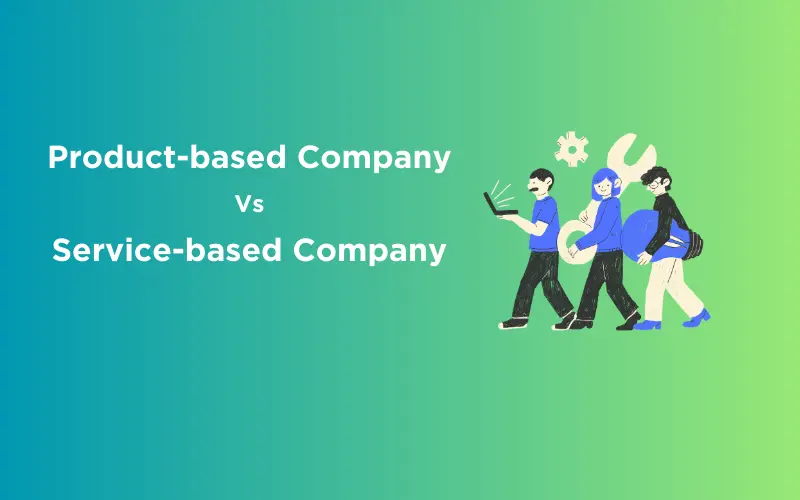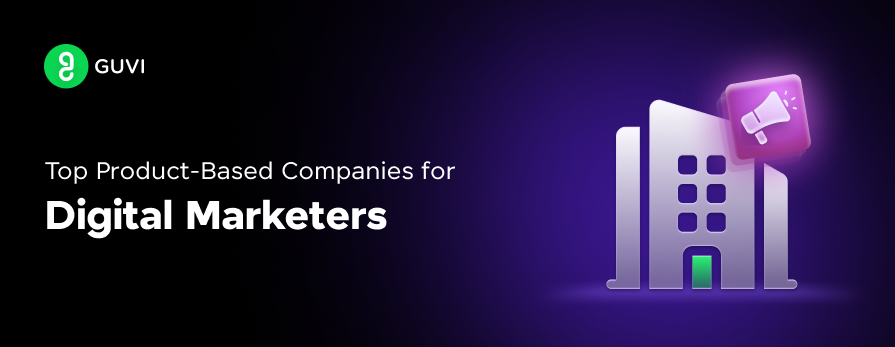
Product-based Company Vs Service-based Company: Which is Best Choice?
Oct 01, 2024 3 Min Read 13144 Views
(Last Updated)
Deciding between joining a product-based company vs a service-based company can be pretty challenging when navigating through the corporate landscape.
This dilemma is something that nearly every professional faces, which often leads to indecisiveness, weighing of pros and cons, and late-night Google searches.
If you find yourself in this situation, let’s work together to find clarity step by step.
Table of contents
- Product-Based Company Vs Service-Based Company: The Basic Difference
- What is a Product-based Company?
- What is a Service-based Company?
- Product-based Company Vs Service-based Company: Which One Should You Choose?
- When Should You Join a Product-based Company?
- When Should You Join a Service-based Company?
- Conclusion
- Frequently Asked Questions (FAQs)
- Does a product-based company have longer sales cycles than a service-based company?
- Which has a higher employee turnover: a product-based company or a service-based company?
- Product-based company vs service-based company: which is more profitable in the initial years?
- In which industries are product-based companies more dominant than service-based companies?
- Is it easier to scale a product-based company vs service-based company?
Product-Based Company Vs Service-Based Company: The Basic Difference
Understanding the fundamental difference between a product-based company vs service-based company is essential. It’s not just about the offerings but also about the mindset, the operations, the work culture, and more.
What is a Product-based Company?

When discussing a product-based company, think of it as a creator. These companies design, produce, and sell tangible products that cater to consumer needs.
Think Apple, Microsoft, or Tesla. You see a device, a software, or a car, and you immediately recognize the brand behind it.
But what really differentiates a product-based company?
- Tangible outcomes: Unlike services, products are tangible. You can see them, touch them, use them. Every product that rolls off the assembly line is a manifestation of months (or even years) of research, design, and testing.
- Innovation cycle: In a product-based company, there’s always a rush to outdo not just competitors but also their previous products. This results in a continuous innovation cycle, pushing the boundaries of what’s possible.
- Branding: Strong product-based companies often become household names. Think of how “Googling” something has become a verb!
Pros of a Product-based Company
Being in a product-based company can be exhilarating. Here’s why:
- Steady revenue streams: Once a product is established in the market, it can generate regular income for the company. Subscription models, like those adopted by software giants, ensure recurring revenue.
- Customer loyalty: Apple users swearing by their iPhones or MacBooks isn’t just coincidence; it’s the magic of brand loyalty, a hallmark of a successful product-based company.
- Clear metrics: Sales, user reviews, and market share provide clear performance metrics.
But what about the challenges that come along with it? Let’s touch on them too.
Cons of a Product-based Company
Like two sides of a coin, the product-based company model isn’t without its challenges:
- Intense R&D costs: Before a product becomes a hit, it goes through rigorous research and development, often burning a significant amount of capital.
- Risk of product failure: Not every product is a hit. Some fail, and the financial repercussions can be huge.
- Rapid technological changes: With the pace of tech advancements, a product will likely become obsolete quickly.
What is a Service-based Company?

A service-based company is essentially an organization that provides intangible solutions.
They could be solving complex IT problems, offering consultancy, or even providing a digital marketing certification course (like us).
But what sets service-based companies apart?
- Tailored solutions: Unlike a one-size-fits-all product, services are often customized to fit the client’s specific needs.
- Relationship-centric: Building and maintaining client relationships is the core of a service-based company.
- Diverse challenges: Every client is unique, and so are their problems. This ensures a varied and dynamic work environment.
Pros of a Service-based Company
Being a part of a service-based company has its perks:
- Recurring business: A job well done can mean repeat business and long-term contracts.
- Flexibility: There’s room to pivot, adapt, and change strategies based on client feedback and changing market dynamics.
- Skill development: Given the diverse challenges, employees often develop a broad skill set.
Cons of a Service-based Company
Similar to a product-based company, it’s not all sunshine and rainbows when you work for a service-based model. The challenges include:
- Demanding clients: Service-based companies often deal with demanding clients, tight deadlines, and shifting goalposts.
- Scalability issues: Scaling services can be trickier compared to scaling product sales.
- Heavy reliance on talent: The success of a service-based company often hinges on the talent of its employees.
Product-based Company Vs Service-based Company: Which One Should You Choose?

Now that you know of the benefits and challenges of a product-based company vs a service-based company, the golden question arises: which one should you choose?
The decision is pivotal, and it’s essential to weigh your personal goals, aspirations, and strengths against what each type of company offers. Let’s consider both scenarios for joining a product-based company vs a service-based company.
When Should You Join a Product-based Company?
The appeal of physical products, creative workspaces, and the excitement of bringing ideas to life – these are the defining characteristics of a product-based company.
Consider joining one if:
- You’re passionate about creation: If the thought of designing, developing, and refining a product excites you, this is your playground.
- You care about job stability: Thanks to its recurring revenues, an established product-based company can often offer more stability than its service-based counterparts.
- You value brand recognition: Being associated with a well-known brand can be a feather in your cap. Just think about dropping names like Google, Apple, or Samsung in casual conversations!
When Should You Join a Service-based Company?
Service-based companies offer a dynamic and ever-changing environment. Consider joining a service-based company if:
- Diversity excites you: Every day is different in a service-based company. Each client for each project brings its own set of challenges.
- Building relationships is your forte: If you’re a people person, you’ll thrive in the relationship-driven world of service-based companies.
- You enjoy problem-solving: A service-based company is all about identifying issues and devising solutions. If you have a knack for problem-solving, this could be your arena.
Conclusion
Choosing between a product-based company and a service-based company isn’t a black-and-white decision. It’s a spectrum of preferences, strengths, and aspirations.
Whether you lean towards the tangible world of products or the dynamic realm of services, what truly matters is finding a space where you can grow, innovate, and make a difference.
Are you interested in a Data Engineering Career? Check out our list of top product-based companies for data engineers.
Frequently Asked Questions (FAQs)
Typically, a product-based company has a shorter sales cycle, whereas a service-based company might have a longer sales cycle due to the need for customized solutions.
Employee turnover can vary widely, but service-based companies often experience higher turnover due to the project-based nature of their work and client demands.
Service-based companies often witness quicker profitability in the initial years due to lower overheads. Product-based companies need more time due to R&D and manufacturing costs.
Product-based companies dominate industries like consumer electronics, automotive, and apparel.
Scaling a product-based company might be more straightforward with increased production, whereas scaling a service-based company requires hiring more talent and maintaining service quality.

























![Top 10 Mistakes to Avoid in Your Data Science Career [2025] 9 data science](https://www.guvi.in/blog/wp-content/uploads/2023/05/Beginner-mistakes-in-data-science-career.webp)



![Top React Interview Questions and Answers! [Updated] 13 React Interview Questions](https://www.guvi.in/blog/wp-content/uploads/2022/01/Top-React-Interview-Questions-and-Answers.webp)

Did you enjoy this article?